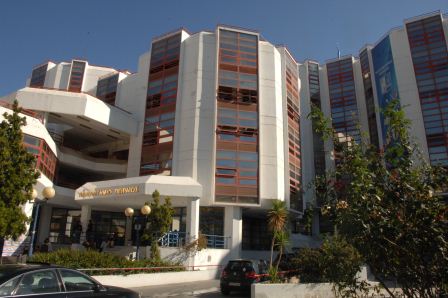The Department
7 January 2024 2024-02-01 23:53- January 7, 2024
- 3:55 pm
The Department
The mission of the Department of Digital Systems is to train young scientists in cutting-edge technologies across different fields of study in information systems, software engineering, data analytics, artificial intelligence, telecommunications, networks, cybersecurity and privacy, computational biomedicine, multimedia, and digital technologies in education and governance. The Undergraduate Program of Studies (POC) aims to create skilled scientists capable of contributing to the development, implementation and management of modern digital technology systems through the acquisition of knowledge as well as the development of critical thinking and skills such as teamwork, time management, and interpersonal communication. These skills combined with specialized knowledge in cutting-edge technologies give our graduates the necessary skills for future success in the professional sector.
Learning Objectives and Skills
The Department of Digital Systems has the mission to train young scientists in cutting-edge technologies that belong to different fields of study and concern information systems, software technology, data analysis, artificial intelligence, telecommunications, networks, cyber security and privacy, computational biomedicine, multimedia, and digital technologies in education and governance. The Undergraduate Study Programme aims to create specialized scientists capable of contributing to the development, implementation and management of modern digital technology systems, as well as to educate them in developing critical thinking, expressing themselves accurately, and theoretical thinking.
The learning objectives of the programme include the acquisition of knowledge and understanding of the technologies involved in creating software, telecommunications hardware, and network services, the familiarization of students with algorithms and complexity, internet protocols and network management, the implementation of applications and services, as well as their familiarization with risk analysis and management methodologies to design and develop secure systems. The laboratory courses aim to help students delve into programming, operating systems, databases, and the design and simulation of telecommunication networks and systems. Upon completion of the undergraduate programme, students will be able to analyze and evaluate the requirements of a system as well as set specifications and design integrated solutions. Laboratory courses and homework assignments aim to help students with the design and implementation of online applications and telecommunications systems, databases, the use of cloud computing methods, signal and image processing, network and information system security and applications using methods of artificial intelligence.
The students of the Department acquire skills and knowledge about the low-level intricacies of computer and operating systems, learn to analyze, design, implement and evaluate software applications based on the principles of procedural and object-oriented programming languages, analyze and design relational databases, utilize and evaluate database management systems and their components, apply development methodologies for information systems, possess theoretical knowledge of data structures and have the ability to implement structures in software under specific functional and non-functional requirements, understand the operation and performance evaluation of network and internet protocols, understand the principles of electromagnetic wave propagation and antenna types, design and obtain the performance of wireless terrestrial and satellite links as well as broadband telecommunications systems, create digital learning systems and develop educational software applications, as well as being able to choose appropriate security measures so that systems and services are protected from possible malicious actions and attacks.
Students’ professional privileges
- The Undergraduate Studies Programme is designed to prepare scientists capable of successfully coping with complex design, development and implementation problems of modern digital technology. Graduates of the Department have already staffed IT and telecommunications companies in the public and private sectors, both in Greece and abroad, as well as educational organizations. Also, many of our graduates follow the research path both in Greece and abroad.
- Qualifications for appointment as IT in positions in public sector bodies (P.D. 347/2003, Government Gazette 315/A’/31-12-2003)
- Qualifications for appointment as Information Technology, Secondary Education Teaching Staff of the Ministry of National Education and Religious Affairs (P.D. 268/2004, Government Gazette 268/A’/28-12-2004)
- Professional Qualification of Graduate Engineers and Graduates of University Education in the fields of Information Technology and Telecommunications (P.D. 44/2009, Government Gazette 58/8-4-2009
- Pedagogical competence
- According to paragraph 2(b) of article 66 (Transitional Provisions) of Law 4589/2019, Government Gazette 13/A’/29-1-2019, “(b) Those who were admitted during the academic years 2013- 2014 and 2014-2015 to teacher training colleges, as defined in par. 2013 and 2013, as defined in article 8, paragraph 2 of article 8 of Law No. 3194/2003 (A΄267)”, those admitted to the Department of Digital Systems, until the academic year 2014-15, are not subject to the provisions of paragraphs 3 and 4 of Article 54.
- Granting of a certificate of pedagogical competence to graduates of the Department admitted up to the academic year 2023-24
According to the 11/04/2019 decision of the Assembly of the Department of Digital Systems and the 13/05/2019 decision of the Senate of the University of Piraeus, regarding the acquisition of basic pedagogical and teaching theoretical training and practical training in the Special Subject (PE86, Computer Science) from the undergraduate curriculum of the Department of Digital Systems, the following applies:
- A new horizontal track is created, entitled Pedagogical and Teaching Competencies (PTI), with nine (9) courses (one (1) Core and eight (8) Elective).
- The titles of three (3) existing courses, which were included in the PTI Direction, are modified in order to reflect more accurately the course content. The mapping to the previous titles is as follows:
- The course of the 6th-semester entitled “Applications of Digital Media in Education” is renamed to “Educational Technology”
- The 7th-semester course entitled “Educational Design” is renamed to “Educational Design STEM”
- The course of the 8th-semester entitled “Teaching of Digital Technologies” is renamed to “Teaching of Informatics” 3) Graduates who have successfully completed and passed six (6) courses (1 Core and 5 Elective), for a total of 30 ECTS (6*5)
- Students are allowed to choose additional courses in each semester from the 5th to the 8th semester for courses from different directions to be available. Consequently, students are allowed to select and take more courses than are strictly necessary for the degree, adding the rest to the diploma supplement.
- The choice of courses to be included in the final degree grade will not be related to the possible acquisition of proficiency but will be decided by the student with a declaration to the Department’s Secretariat.
Quality Assurance
Quality Policy
The Department of Digital Systems recognizes quality as a key means of achieving an excellent level of academic and research work. Staff and students develop activities that are consistent with the quality policy of the Department and in line with the values and goals of the University of Piraeus.
The Digital Systems Department’s Quality Policy expresses the terms and states the Department’s commitment to ensure the quality of its programs, as well as its overall performance, in line with the international requirements for higher education quality. The Quality Policy applies to all members of the academic community of the Department including parties who in any way cooperate, assist and are affected by the quality of the Department’s work and results.
DECLARATION OF QUALITY POLICY OF THE DEPARTMENT OF DIGITAL SYSTEMS
In view of the above, the Department of Digital Systems is committed to implement a Quality Policy that defines specific goals, means and processes of quality, evaluation and continuous improvement, supporting its academic profile, orientation and goals of its curricula, the development of its human resources (staff and students), the development of its research action, and the development of innovation, reinforcing its interconnection with international bodies and with the local community.
To implement this Policy, the Digital Systems Division commits to implement quality processes that ensure:
- (a) The appropriateness of the structure and organization of curricula
- (b) The pursuit of learning outcomes and qualifications in accordance with the European and National Higher Education Qualifications Framework
- (c) The promotion of the quality and effectiveness of teaching work
- (d) The relevance of the qualifications of the teaching staff to its targeted outcomes and goals
- (e) The promotion of the quality and quantity of the research work of the academic unit members
- (f) The interconnection between teaching and research
- (g) The graduates meet the labor market expectations
- (h) The quality of support services, such as administrative services, libraries and student care services
- (i) The conduct of the annual review and internal audit of the quality assurance system in cooperation of the Internal Evaluation Groups with the University of Piraeus Quality assurance Unit and the Quality Assurance & Accreditation Authority for Quality in Higher Education.
Certification
The Department of Digital Systems’ Undergraduate Programme of Studies was accredited by the National Authority for Higher Education in 2019. Accreditation is a quality assurance process carried out on the basis of specific, predefined, internationally accepted and pre-published quantitative and qualitative criteria and indicators, aligned to the Principles and Guidelines for Quality Assurance in the European Higher Education Area (ESG 2015).
The purpose of the accreditation of a curriculum is to ensure the quality of higher education, as well as the efficiency and transparency of the overall operation of Higher Education Institutes.
The conclusions of the committee that conducted the assessment are very positive for the department, praising the painstaking efforts of all its stakeholders and at the same time offering motivation to continue operating at even higher levels of quality and productivity.
An excerpt of the conclusions included in the report of the external evaluation and accreditation committee is provided for illustrative purposes:
The Department closely adheres to the institutional principles (set by the University) which govern the collection of data regarding students, teaching staff, course structures, annual monitoring, assessments, progression, and completion rates.
The Department makes good use of the research funding it receives by equipping the labs to a very high standard, despite the obvious space restrictions, which affect virtually all campuses located in the centre of large capital cities.
The undergraduate program has adopted a wide range of modes of delivery (lectures, practicals, labs) and assessment methods (written and oral examinations, intermediate exercises, practical laboratory assessment, and coursework). Assessment criteria and methods are communicated at the beginning of each course electronically and during the first lecture.
The research activities of the academic staff are clearly one of the strengths of the department, as evidenced by the number of publications in high-quality journals and reputable conferences, the high number of citations, as well as research income and participation in prestigious European research projects (Horizon 2020).
The Department of Digital Systems in Numbers
| Faculty | 23 |
| Postgraduate Programmes | 10 |
| Research laboratories | 10 |
| Papers in peer-reviewed journals | 1.039 |
| Papers in Conference Proceedings | 1.923 |
| Patents | 17 |
| International awards and distinctions | 61 |
| Citations | 69.829 |
| Research Projects (National & European) | 31 |
| IT projects by companies and organizations | 52 |
| External project partners | 118 |




